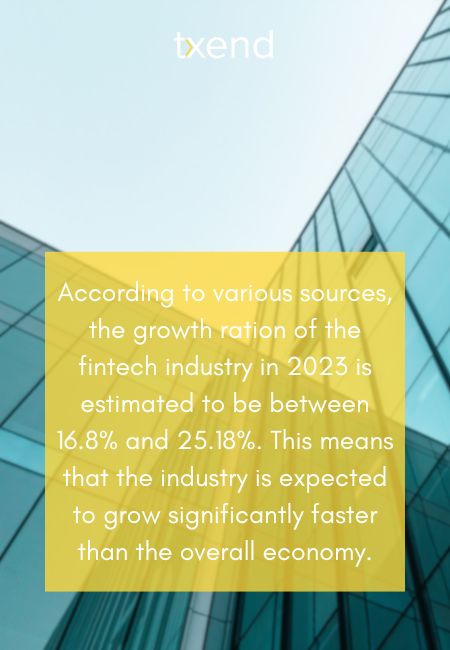How To Start a Fintech Company?
The article titled “How to Start a Fintech Company?: Starting Your Own Venture” is a comprehensive guide aimed at entrepreneurs and individuals interested in launching their own fintech company in the US market.
The primary focus of the article is to provide a step-by-step roadmap and actionable insights on how to initiate and navigate the complex journey of establishing a fintech startup.
The article delves into the intricacies of the fintech industry, emphasizing the significance of understanding the dynamics of fintech lending and the roles of fintech lenders within the market.
It outlines key strategies, regulatory considerations, and market trends that aspiring fintech entrepreneurs need to be aware of to increase their chances of success.
Readers can expect to find valuable information on the initial planning and ideation stages, including how to identify a target niche within the fintech landscape and develop a unique value proposition.
The article explores the essential steps for legal and regulatory compliance in the US, ensuring that entrepreneurs are well-prepared to navigate the complex regulatory environment specific to financial technology.
Additionally, the article provides practical advice on securing funding, building a talented team, and developing a go-to-market strategy tailored to the fintech sector. It may also touch on the importance of technology infrastructure and cybersecurity measures, given the critical nature of financial data in fintech operations.

By reading “How to Start a Fintech Company?” aspiring fintech entrepreneurs can gain valuable insights and a clear roadmap for entering the US market, while also taking into account the particular difficulties and opportunities that come with launching a fintech business in this fast-paced and heavily regulated sector.
Key Takeaways:
- To start a FinTech company in the USA, follow these steps: research the market, create a solid business plan, secure funding, obtain necessary licenses, and build a talented team.
- Avoid regulatory non-compliance, inadequate cybersecurity measures, insufficient capital, lack of differentiation, and failure to build customer trust when launching a fintech startup in the USA.
- Launching a fintech venture entails overcoming regulatory complexities, securing capital, and building trust to succeed in the ever-evolving financial technology landscape
- Overcoming fintech venture challenges involves regulatory compliance, robust cybersecurity, talent acquisition, niche focus, and transparent customer communication.
How to Start a FinTech Company in the USA ? 10 Step Guide
Identifying the Fintech Opportunity:
In the competitive landscape of the US fintech market, it’s crucial to pinpoint a unique opportunity or problem that your fintech company will address. Understand the specific pain points in the finance industry that your technology can solve or improve upon.
Validating Your Fintech Concept:
Before diving into development, By conducting market research and requesting input from potential users, you may validate your fintech proposal.This step is essential in ensuring that your concept has real-world demand and can attract users.
Navigating Regulatory Waters:
In the heavily regulated US financial sector, having a clear understanding of financial and technology regulations is paramount. Complying with federal and state regulations, including those related to data security, consumer protection, and financial services, is crucial to avoid legal issues.
Defining Your Fintech Services:
Determine the specific fintech services your company will provide. Whether it’s peer-to-peer lending, digital payments, robo-advisors, or blockchain-based solutions, your focus should align with market demands and regulatory compliance.
Understanding Your Target Audience:
Getting to know your target audience is essential for designing user-friendly fintech solutions. In order to make your offerings fulfil their expectations, you must comprehend their needs, preferences, and pain areas.
Analyzing the Competitive Landscape:
Conduct a comprehensive analysis of your competitors in the US fintech space. Determine their advantages and disadvantages, and look for opportunities to innovate or differentiate your offerings where others may lag.
Selecting the Right Tech Partner:
Choosing a web and app development company with fintech expertise is crucial. Choose a partner who has a history of completing successful fintech projects, knows the particular difficulties and security needs of the financial technology industry.
Prioritizing Data Security:
Security is non-negotiable in fintech. Prioritize robust cybersecurity measures to protect sensitive customer data and ensure regulatory compliance. Implement encryption, access controls, and regular security audits.
Securing Funding
In the US, securing funding for fintech startups can be competitive. Explore options like venture capital, angel investors, crowdfunding, or partnerships with financial institutions to secure the necessary capital for growth and development.
Continuous Development and Improvement:
Fintech is an ever-evolving field. Commit to continuous development and improvement of your technology and services based on user feedback, market trends, and regulatory changes. Stay agile and adaptable to thrive in the dynamic US fintech market.
By following these steps, entrepreneurs can navigate the complexities of the US fintech market and lay a strong foundation for their fintech venture’s success
Key Considerations for Launching a Fintech Venture in the USA
Starting a fintech company in the USA is an ambitious endeavor, and careful consideration of several key factors is essential for success. Fintech, with its intersection of finance and technology, offers tremendous opportunities but also comes with unique challenges in the highly regulated American market.
Before embarking on your fintech journey, it’s imperative to identify a specific niche or opportunity within fintech lending or related areas that your company will address. Validating your idea through market research and potential user feedback ensures there’s a real demand for your solution.
You will also like:
Navigating the complex regulatory landscape is paramount. A deep understanding of financial and technology regulations, including data security and consumer protection laws, is necessary to avoid legal pitfalls.
Furthermore, defining your fintech services, understanding your target audience, and analyzing competitors will shape your strategy. Choosing the right technology partner with fintech expertise and prioritizing data security are critical steps.
Securing funding, often through venture capital or strategic partnerships, is crucial for growth. Lastly, fostering a culture of continuous development and adaptation is essential in the ever-evolving fintech industry.
It takes careful preparation, compliance, creativity, and a strong commitment to addressing the changing needs of the market and customers to launch a fintech enterprise in the USA.
Common Pitfalls to Steer Clear of When Launching a Fintech Startup in the USA:
Inadequate Market Research:
Skipping thorough market research can lead to launching a fintech solution that doesn’t address actual market needs or competitive gaps.
Neglecting Regulatory Compliance:
Fintech is heavily regulated in the USA. Not adhering to state and federal regulations can result in legal issues and fines.

Underestimating Compliance Costs:
Compliance can be costly. Failing to budget for compliance measures can strain finances and hinder growth.
Weak Cybersecurity Protocols:
Inadequate data security measures can lead to data breaches and erode customer trust. Robust cybersecurity is essential.
Ignoring Customer Feedback:
A product or service that doesn’t appeal to customers may be the result of failing to pay attention to client feedback.
Rapid Scaling Without Infrastructure:
Scaling too quickly without a solid infrastructure can lead to operational chaos and service disruptions.
Ignoring Partnerships and Collaborations:
Isolating your fintech venture can limit growth. Partnering with banks, other fintech firms, or service providers can provide valuable resources.
Overlooking Talent Acquisition:
If you don’t secure your intellectual property, rivals might steal your discoveries.
Inadequate Risk Management:
Failing to assess and mitigate risks can lead to financial losses. A risk management strategy is vital.
Poor Marketing and Branding:
Underestimating the importance of marketing and branding can hinder customer acquisition and market penetration.
Unsustainable Business Model:
Creating a fintech business model that relies heavily on discounts or unsustainable practices can lead to financial instability.
Lack of Exit Strategy:
Not having a clear exit strategy can hinder investor confidence and limit funding opportunities.
Failing to Adapt to Market Changes:
The fintech landscape evolves rapidly. Not adapting to market changes can render your solution obsolete.
Overlooking Intellectual Property Protection:
Failing to protect intellectual property can result in competitors copying your innovations.
Ignoring User Experience (UX):
Neglecting the user experience can lead to poor customer retention and bad reviews.
By being aware of and actively avoiding these common pitfalls, you can increase the chances of success when starting your fintech venture in the USA.
10 Challenges Faced When Launching a Fintech Venture

Regulatory Complexity:
The regulatory environment for fintech companies in the USA is complicated and differs from state to state. It can be quite difficult to comply with federal and state standards including those pertaining to AML and KYC are terms for “know your customer.”
Licensing and Compliance:
Obtaining the necessary licenses and permits to operate as a fintech lender can be time-consuming and costly. Ensuring compliance with state lending laws and regulations is crucial to avoid legal issues.
Capital Requirements:
Fintech lending often requires a substantial amount of capital to fund loans. Securing the necessary funding and managing capital adequacy can be challenging, especially for startups.
Cybersecurity Concerns:
Fintech companies deal with sensitive financial data, making them attractive targets for cyberattacks. To secure the business and its clients, it is crucial to have strong cybersecurity measures.
Competition:
With multiple well-established competitors and new startups frequently joining the market, the fintech sector is extremely competitive. Differentiating your company and gaining market share can be challenging.
Customer Trust:
Building trust with customers is crucial in the financial sector. Fintech startups may face skepticism from potential customers who are more accustomed to traditional financial institutions.
Talent Acquisition:
Finding and retaining skilled employees with expertise in fintech and technology can be difficult, as larger companies often compete for the same talent pool.
Data Privacy and Compliance:
Fintech companies deal with vast amounts of customer data, which raises privacy concerns. It’s crucial to abide by data protection regulations like the CCPA and GDPR, if applicable.
Scalability:
As fintech startups grow, they must scale their operations efficiently to meet increasing demand while maintaining a high level of service and compliance.
Economic Volatility:
Economic downturns can impact the fintech industry, affecting loan performance and investor confidence. Preparing for economic fluctuations is essential.
Addressing these challenges strategically and staying informed about regulatory changes will be crucial for the success of your fintech venture in the USA.
10 Strategies For Overcoming Challenges When Launching a Fintech Venture
In-Depth Regulatory Research:
Prioritize a comprehensive understanding of federal and state regulations governing fintech. Engage legal counsel with fintech expertise to ensure compliance.
Licensing and Compliance Teams:
Assemble a dedicated team responsible for licensing and compliance. Stay updated on changing regulations and create robust processes to maintain compliance.
Capital Planning:
Develop a clear financial plan, including securing funding sources, venture capital, or partnerships with investors to ensure you have the necessary capital to operate and grow.
Cybersecurity Investment:
Allocate resources to build a strong cybersecurity infrastructure. Regularly update security measures and conduct penetration testing to protect customer data.
Competitive Edge:
Focus on niche markets or innovative solutions that set your fintech company apart from competitors. Develop a compelling value proposition to attract customers.
Customer Education:
Educate potential customers about the benefits and security of fintech services. Transparency and clear communication can help build trust.
Talent Recruitment and Retention:
Establish an attractive work culture and competitive compensation packages to attract and retain top talent in the fintech and technology sectors.
Data Protection Measures:
Implement strict data protection policies and encryption practices to safeguard customer information. Comply with data privacy laws and regulations.
Scalability Planning:
Create a scalable business model that can accommodate growth. Spend money on infrastructure and technology that can grow to meet the escalating needs of your clientele.
Risk Management:
To deal with economic volatility, develop a risk management strategy. Diversify your loan portfolio and establish contingency plans for adverse economic conditions.
By addressing these points proactively, you can mitigate the challenges associated with starting a fintech company in the USA. You may boost your chances of success and lay a solid foundation for your business by doing this.
How can txend help in starting a fintech company in the USA?
Txend provides helpful support at every stage of your entrepreneurial journey with its extensive portfolio of services and tools designed specifically for fintech firms.
First and foremost, Txend provides essential guidance on navigating the intricate regulatory landscape that governs fintech operations in the USA. Their experts can help you understand the specific licensing requirements, compliance protocols, and regulatory nuances, ensuring that you stay on the right side of the law from day one.

Additionally, Txend offers access to a network of experienced fintech lenders and industry professionals, fostering invaluable connections that can lead to potential partnerships, investment opportunities, and mentorship. This networking advantage can significantly accelerate your company’s growth trajectory.
When it comes to fintech lending, Txend provides essential insights and resources to help you develop and refine your lending strategies.
Their knowledge and experience in this field can be extremely helpful in developing creative and aggressive lending strategies that satisfy the changing demands of the market you are targeting.
In summary, Txend serves as a valuable ally for aspiring fintech entrepreneurs in the USA. Its guidance, connections, and resources can significantly streamline the process of starting and growing a fintech company, allowing you to focus on innovation and achieving your business goals with confidence.
FAQs:
Key steps for launching a fintech company in the US: Regulatory compliance, licensing, capital, cybersecurity, differentiation, trust-building, talent, scalability, and risk management.
To secure funding and partnerships for your US fintech lending startup, explore venture capital, angel investors, and collaborate with industry peers.
Entrepreneurs in the US fintech market should navigate regulatory hurdles, secure capital, differentiate, prioritize cybersecurity, and build trust to overcome challenges successfully.
Conclusion | How To Start a Fintech Company?
In conclusion (how to start a fintech company), embarking on the journey to start your own fintech company is an exciting and potentially rewarding endeavor. Throughout this article, we’ve explored the key steps and considerations involved in launching your fintech venture in the USA.
From understanding the regulatory landscape and licensing requirements to securing the necessary capital and building a robust cybersecurity infrastructure, these foundational aspects are vital for your success.
Moreover, we’ve highlighted the importance of differentiation in the highly competitive fintech industry. Creating innovative solutions and carving out a unique niche can help your company stand out and attract customers in a crowded marketplace.
Building trust with customers, both through transparent communication and adherence to data protection regulations, is paramount. Customer trust is the bedrock of success in the financial sector, and fostering it should be a continuous effort.
Additionally, we’ve emphasized the significance of talent acquisition and retention, as skilled professionals are the driving force behind fintech innovation. Cultivating a positive work culture and offering competitive compensation packages are essential steps in this regard.
Lastly, scalability planning and risk management strategies will be key as your fintech company grows. Adapting to changing market conditions and economic fluctuations is essential for long-term sustainability.
As you embark on your fintech journey, keep in mind that the landscape is constantly evolving, with new technologies and regulations emerging regularly.
For overcoming obstacles and capturing chances, it will be essential to remain knowledgeable, flexible, and committed to your objective.
Starting a fintech company is a journey filled with challenges, but with the right strategy, determination, and support, it’s a journey that can lead to significant success and innovation in the world of finance.



